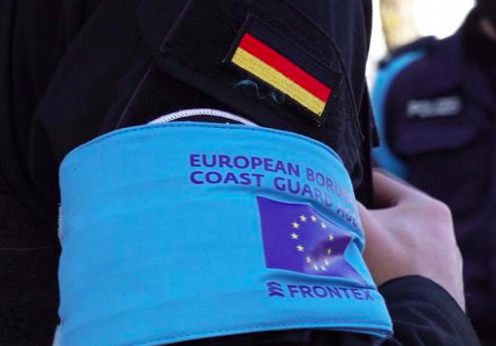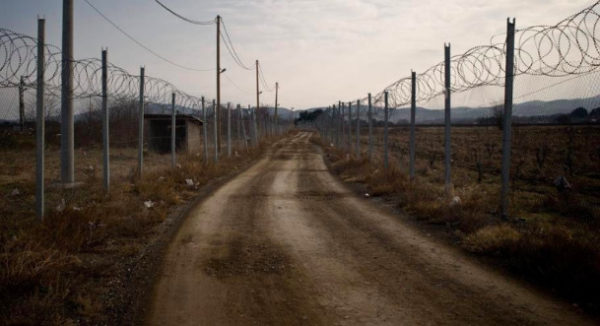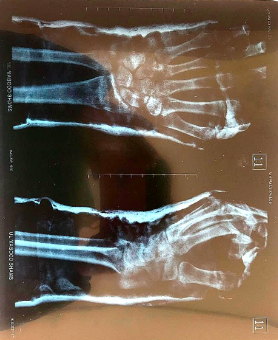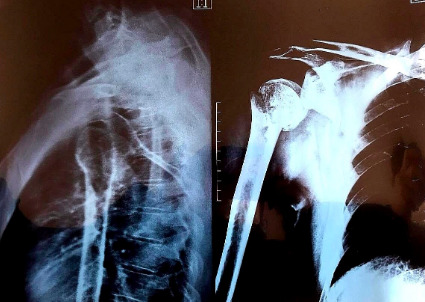The respondent is a 39-year-old man from Pakistan. On the 9th and 10th of February 2021, he was pushed back from North Macedonia to Greece twice. Within the past 6 months, the respondent tried to cross the border from Greece to North Macedonia six times.
The respondent explained that on the 9th of February, he crossed the border to North Macedonia close to the town Gevgelija along with 11 men from Afghanistan, Pakistan and Bangladesh. One 17-year-old minor was present and the others were in their mid-twenties. It was approximately 8 p.m.
The respondent and his group walked further into North Macedonia for around four hours. At around 12 pm they crossed a road in a forest when what was reported as five German police officers approached the group in a jeep. The respondent identified the officers as German because of the German flags on the sleeves of their dark blue uniforms. He also reported seeing a light blue armband with the European Union flag on it.
“They have a belt in here [pointing at upper arm] and a German flag and European Union logo.”

Alleged Frontex involvement in North Macedonia has been documented by BVMN in the past. The latest report can be found here. The officers asked the group a few questions in English and made a call afterwards.
“They say where do you come from [and I said] I come from Pakistan.” [The officers also asked where the group crossed the border].
Shortly after, a Macedonian police van arrived. The respondent reported that inside were three male Macedonian police officers in blue uniforms. The officers confiscated each person’s phone and were not returned.
Then, the group was ordered to enter the van. The van drove them across the border back to Greece. The exact location and time are unknown.
Later that night, the respondent and the same group of 11 crossed the border to North Macedonia in the same area again and walked further into the country throughout the night. On the morning of the 10th of February 2021 at around 7 a.m. the group was sleeping in a forest when what they described as three male German police officers approached them. The respondent described the officers as wearing dark blue uniforms and a light blue armband with the European Union flag. They were different officers from the night before, according to the respondent.
“The German police is coming and they wake me. They have a pistol. They say stand up.”
One officer pointed the gun directly at him. The respondent believed that the gun was unloaded.
“Just for the scaring. Don’t worry.”
Once stood up, the respondent saw multiple vehicles parked in the distance. One of the vehicles was a jeep and identified as the same model from the night before. The respondent was unable to count how many officers were present.
The officers described by the respondent as German made a call and soon after three Macedonian police officers arrived in a van. One woman and two men. The respondent asserted how the woman carried a ‘soft rubber’ baton and the men ‘hard rubber’ batons. The three Macedonian officers immediately started to insult the group. The respondent described the situation the following:
“Why you come to my country?’ I said I’m not coming to your country, I just cross your country. Why must you come to my land? You motherfucker.”
One officer then allegedly spat on the respondent.
Afterwards, the group of 11 was ordered to line up. Two of the Macedonian officers formed a passage by standing opposite each other in front of the van. Each member of the group had to walk through one by one. The two officers hit each person repeatedly with their batons. When the respondent had to pass through he tried to protect himself by holding his arms around his head. Consequently, he was hit on his arms and shoulders. This resulted in broken bones in his left arm and the dislocation of his right shoulder. The other people did not suffer any substantial injuries. The respondent asserted how ‘his bad luck’ caused him the most severe injuries. He stated that the beatings did not go on for long but stressed the particularly hard and quick strokes with the batons.
“They hit me again and again and again. One till two minutes.”
Once the group was gathered in the van, they drove directly to the Greek-North Macedonian border. The respondent did not see the German officers and the other vehicles again. The exact location could not be verified.
The van stopped at this particular border gate. The gate is right next to train tracks as the respondent confirmed. In recent years, the police of Greece and North Macedonia have created and maintained a fenced corridor at the border, using gates to closely control the movement of persons. More information on the gate can be found in the BVMN December 2020 report.

One of the police officers opened the gateway. Before crossing into North Macedonia, each person was hit on the legs with batons by the three officers.
“Here. In leg. Because he know [I‘m] very bad injured.”
The group of 12 then walked into Greece to Polykastro for approximately three hours. From there, they took a bus to Thessaloniki.
In Thessaloniki, the respondent said he went to a hospital. There, an x-ray confirmed his broken bones and dislocated shoulder (see images below). The respondent’s arm was put in plaster and he got two slings for support. The doctor informed him that he might need to have surgery in a few weeks. The respondent remarked that he is unable to pay for the surgery.


The respondent provided the x-rays from the hospital to BVMN.
(A: Wrist in plaster. Broken bones are difficult to detect because of the plaster and the quality of the photo. B: Dislocation fracture of the humeral head.)
At the end of the interview, the respondent reported how his injury makes his living in the streets even more difficult.
“I can’t wash my face for the last eight days. No water. No washing. No bathroom. No toilet. What is this? It’s very hard for me.”
